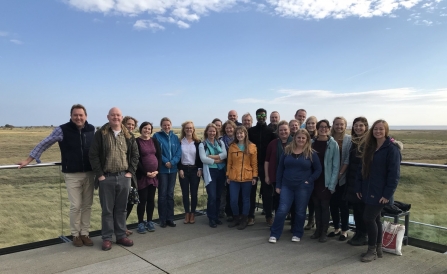The last couple of days I have been attending a Marine Protected Area Management workshop. Marine Protected Areas (MPAs) are conservation-focused zones because they contain diverse habitats or protected species. They also tend to have a number of organisations that are responsible for different aspects of their management, which can include central and local government departments, the Environment Agency, conservation groups and local groups, so they require much diplomatic co-ordination. The managers for a number of the MPAs around the UK came together to discuss the challenges they face and to share good practice.

@MPAs_UK - Marine Protected Areas UK
Many themes were discussed including the challenges of engaging and co-ordinating the many different stakeholders and how to do more with reducing levels of funding. However, one of the common themes was recreational disturbance, how people using the sea and coastal areas affect the habitats and species that are there. The reason many people visit and use the coastline and sea is because of its beauty or because of the species found there but their use obviously has an impact upon that environment. These recreational challenges can range from where we park our cars, littering and dog-walking to jet-ski use and how and where boats are moored.
Dog-walking was an interesting topic, and not one I had particularly considered before (apart from when people leave their little packages hanging from trees and fences). But not only were they an issue from a faeces perspective, they could also disrupt the habitats of sensitive species, particularly around breeding and birthing times, endangering the future of species populations. For instance, it was necessary to prevent dogs going onto the beach at Gibraltar Point, near Skegness, during the spring and summer to protect the fragile populations of certain bird species.
The dilemma was that they wanted people to use and engage with the coastal areas but needed them to do so sensitively so that the environment that we treasure is preserved, and hopefully enhanced. This brought challenges of how to effectively communicate peoples’ responsibilities, and the reasons that certain behaviours are necessary, and prevent poor behaviour.
Unfortunately, putting signs and dog waste bins up does not necessarily improve behaviours, can cause different problems i.e requiring someone to empty them and vandalism, and has an impact on the location’s appearance and how it is used. Fortunately, there were a number of great ideas about how to approach these challenges but, as usual, they required resources – well that’s simple then!
Doug

